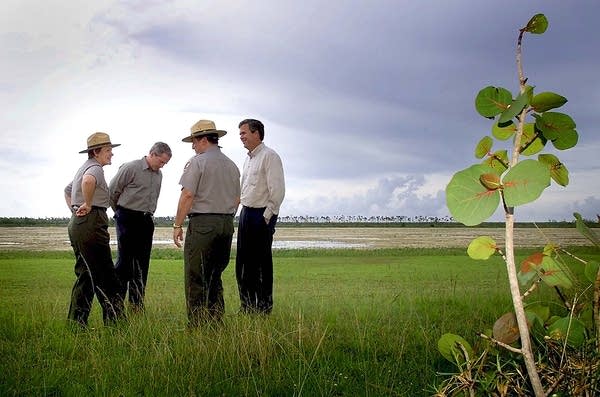Bachmann's Everglades drilling comment doesn't resonate in Florida
Go Deeper.
Create an account or log in to save stories.
Like this?
Thanks for liking this story! We have added it to a list of your favorite stories.

During a four day presidential campaign tour through Florida, Republican Rep. Michele Bachmann told a crowd that she'd be open to oil and gas drilling in the Everglades, a vast and ecologically diverse stretch of wetlands and swamps that includes parts of the nation's park system.
"The United States needs to be less dependent on foreign sources of energy and more dependent upon American resourcefulness," she said. "Whether that is in the Everglades, or whether that is in the eastern Gulf region, or whether that's in North Dakota, we need to go where the energy is."
She would look for oil in the Everglades only if drilling could be done without harm to the environment, she said.
While Florida has been the site of heated debate over energy exploration in the Gulf of Mexico, oil drilling in the protected Everglades isn't typically a topic of discussion, said Mark Ferrulo, who is executive director of the left-leaning advocacy group Progress Florida.
Learn how to have civil, political conversations with our e-book Talking Sense
Political debates with family or friends can get heated. But what if there was a way to handle them better?
Download our free e-book, "Talking Sense: Have Hard Political Conversations, Better," and learn how to talk without the tension.
"There's no debate or discussion among the most conservative, pro-drilling people about opening up the Everglades to drilling," Ferrulo said. "It would be as crazy as saying, 'let's drill under Space Mountain' in Disney World."
Bachmann may have been talking about drilling that happens in the Big Cypress National Reserve, a part of the Everglades ecosystem but where a drilling company has long retained mineral rights.
Compared to the millions of barrels of oil Americans consume daily, only a couple thousand barrels of oil are produced there a day, said Edward Glab a professor at Florida International University who has 25 years experience in the oil and gas industry.
And it's relatively low quality stuff that's hard to get out of the ground and difficult to clean-up, he added.
"The question in my own mind is whether the juice is worth the squeeze," he said. "[The Everglades] is an extraordinary important and fragile ecosystem... There are other places we could go that would be far less risky with greater quantities of oil."
Politically speaking, her message may have been off the mark because many Floridians across the political spectrum view the Everglades as a state treasure.
According to the Everglades Foundation, a non-profit that advocates for restoring the land, former Gov. Jeb Bush spent on average $100-$200 million annually on restoring the area during his tenure, calling it "an important Florida treasure" and his "highest environmental priority."
The same group hired a Republican polling firm earlier in the year to gauge Floridian views on the park. According to the Foundation, roughly two-thirds of likely Florida voters said restoring the Everglades was either extremely important or very important to them.
Bachmann's comments have also rankled Rep. Debbie Wasserman Schultz, who represents parts of South Florida adjacent to the park and doubles as chair of the Democratic National Committee.

"We need to look forward and invest in the future, and we won't get there with unthinkable, reckless and irresponsible Republican proposals like drilling for oil in the Everglades," she said in a statement carried in The Hill newspaper. "As a Floridian, I can see that Michele Bachmann's outrageous proposal to drill for oil and natural gas in the Everglades, demonstrates just how out of touch Republicans are with the needs of Floridians and all Americans."
George Gonzalez, a political science professor at the University of Miami said Bachmann's comments may have been meant to highlight her broader opposition to what she perceives as strict exploration rules, a line likely to appeal to voters who want to roll back government regulation in general.
"There's never any discussion over drilling in the Everglades," said Gonzalez. "Her message is, 'We should allow drilling in any instance regardless of the circumstances.' The more dubious claim is that that drilling could be environmentally safe."
Indeed, Bachmann has recently targeted the Environmental Protection Agency, saying that burdensome regulations promulgated by the department are job killers.
"We do have EPA's in each of the 50 states and I think that it's up to the states," she said, according to an Associated Press report. "The states have the right to develop their own environmental protections and regulations, as they all have."
Bachmann has also promised $2 per gallon gas if she becomes president, a pledge critics say is unattainable without another serious economic downturn.





